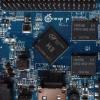Search the Community
Showing results for tags 'orangepipc'.
-
Good day friends! I have Orange Pi PC and I decided to try Armbian. Excellent build! My congratulations to the developers Before, I used the image of 'loboris'. I had a problem with the management of the LED in Armbian. How to make u-boot turn red led to the kernel boot? Edit fex file no avail
-
Running apt-get dist-upgrade tries to install the new Allwinner H3 kernel but it takes the Orange Pi PC a really, really long time to extract and install it. The heartbeat LED flashed really fast and after 30 minutes I elected to stop it. Has anyone succeeded doing apt-get dist-upgrade today to get the new kernel on the Orange Pi PC or Orange Pi One, and, if so, how long did it take? The packages are: linux-firmware-image-sun8i linux-headers-sun8i linux-image-sun8i linux-jessie-root-orangepih3 linux-u-boot-orangepih3-default Thanks in advance for any information or advice.
-
Hi, 1st of all, thanks for the excellent job on Armbian so far, really feels very solid compared to most other distros. Here is my little problem: Installed Armbian_5.14_Orangepipc_Debian_jessie_3.4.112_desktop Realtek RTL 8188 plugged in into any USB port Followed Rudolfos tutorial Reboot - wireless works flawlessly Update via apt-get update/upgrade --> 8188 still recognized, but board locks up or reboots when I try to connect to an AP I am right now preventing updates to 5.14 as per attachement, but this is obviously not a preferred solution. The driver used is the 8192cu,the device ID is 0bda: 8176 Realtek 8188cus. Any directions? Best, -Thomas
-
-
Hi all. I'm running armbian in all my orangepi boards since I've them and the distro is great and we'll developed. (thanks!) I run them with telephone chargers (htc and Samsung) 2/1.5A directly connected to the board via a 30cm cable. I don't know what's the status of data pins (d+ d-) but I think they are left open by the cable. They are used for sdr use running dump1090 all the time. In the aim of reducing the heat I've disabled two cores (only recently) out of four and installed a copper heatsink on the cpu. The problem is that from time to time I found my boards unresponsive from ethernet and serial port, so completely stuck. Only a reboot works. Do you have any idea of what can cause this behaviour? Thanks
-
Hello all. I am having problems making nand-sata-install script work for installing to my external HDD. I used this (or similar) script in the past on loboris' images and it was working. After some time and experimenting with other images etc. I settled on Armbian, everything worked great, until I started the same script. I made 30 ish GB partition for the system and leave the rest as NTFS storage partition for mounting it later on the OS. But with armbian's script, i couldn't get my HDD to work with it. I am choosing to boot from sd and system from USB (sata) option, choosing the correct partition (/dev/sda2 in this example) and starting the process but it fails when it copies everything over to HDD. At around 6 to 10 percent. Errors i am getting are from rsync, it throws up bunch of lines for every file it tries to copy, stating destination filesystem is read-only. rsync errors 23, 27 and 30. error lines on dmesg shows these for bunch of blocks "Buffer I/O error on device sda2, logical block 4752419" So i figured maybe my HDD was failing (it was bought 3 years ago, not that old) I connected it to SeaTools and it gave some errors, S.m.a.r.t data was showing some errors so i sent it to Seagate for a RMA. I received my new HDD today, and getting the same damn errors as above. Seatools shows everthing is OK and s.m.a.r.t data is OK too. What is the problem in this case? Is the 2nd HDD i received is faulty too or am i doing something wrong? Sorry for my bad English.
-
Just started with Orangepi and ARMbian ... ARMbian is a very nice OS. Especially since there's a RAW image for Orange pi! Thanks! I've got two DS18B20 working perfectly with my Orange pi pc! But now I've troubles with the BMP085 /BMP180. With my old Raspberry pi it was pretty easy, but how can I get the BMP180 running? I 've read there are modules for ARMbian, but I've read as well I've got to compile my own module. Does anybody know where can I find the files /module to load or compile?
-
I've noticed that Armbian builds are taking a really long time to power up on Orange Pi PC and Orange Pi One. Is there some way I can see what's going on in the bootloader that's causing these long delays? Also, if I run apt-get dist-upgrade and take the latest kernel, it never boots after that point. I think something's wrong with the boot sector (or whatever it is) that is written/updated on the SDCard. The Orange Pi power LEDs don't light up until the bootloader successfully finds an OS on the SDCard. All of the builds over at orangepi.org work just fine but the Armbian ones aren't working right. I'm using a diverse collection of very high-quality SDCards from different manufacturers. Any thoughts? Thanks in advance.
-
Is there an easy way to dual boot Armbian and OpenElec on my OrangePi PC.
-
I have spent hours trying to get any activity on my new Orange Pi PC I just purchased. I have been downloading and burning different images, reformatting / trying different SD cards, 2 power supplies, using DD, WIn32DiskImager, Rufus, scanning my SD using F3, etc lots of "pain". The solution - which I found somewhere halfway by accident - is that some boards do not have card slots mounted correctly, but you can flex the card to make it work. So yes, I flexed the SD card and applied power, and like magic I got actual LED activity. OMG it boots now! Would have worked the entire time but it did not make contact with the SD card. My solution for now is to stick a layer of paper to the back of the micro SD card so it fits tighter, and makes contact. This is working for me but can it be reliable over time? Not sure. Would like a better fix. Does anyone know a method to fix the slot so it makes reliable contact without the extra wedge? May I suggest that this could be added to a troubleshooting area of the getting started? I have been going crazy re-reading the getting started tutorial and other tutorials, trying to fix what was not broken - my SD is fine, my PS is fine, my first burned image would have worked. A 3rd source of trouble could be a poor-fitting TF card. So at least it ends well! The card boots and seems really speedy! (Thanks to the Armbian maintainers for a nice OS image - that was a cool first-time login sequence) Willie
-
Looking for some guidance on how to play mp4/h264 files from the command line.......tried numerous method but not getting any joy (mplayer / mpv). Any definitive guide out there or help appreciated......pulling my hair out with this
-
Hi, after a long search, I found how to use the display driver without fbtft https://www.raspberrypi.org/forums/viewtopic.php?t=124961 I used the display 3.5in TFT witch SPI on the OPi PC on Armbian jessie. lcd on ali: http://www.aliexpress.com/item/High-end-3-5-LCD-Touch-Screen-Display-Module-Board-320x480-RGB-For-Raspberry-Pi-2/32611946526.html?spm=2114.30010308.3.21.j1gFEx&ws_ab_test=searchweb201556_8,searchweb201602_2_10048_10047_10037_10017_10046_10033_10045_406_10032,searchweb201603_1&btsid=057be304-5a97-4dff-9905-87cf320dcb67 After some refinement because this interface is very very slow my modified code is attach https://github.com/maxk9/3.5-TFT-LCD-KeDei.git sorry for my bad english
-
Hi, first post here, so a bit of context: I have owned my Orange Pi PC for a while and have it set up running the latest Armbian with legacy kernel, serving files over AFP and SMB on the local network and running a Transmission daemon. I set it up with the desktop image but followed the instructions in the documentation to remove the desktop environment etc. I believe that this has left the VDPAU and Cedrus related files intact. As I am using it as a media server I thought it would be interesting to leverage the H3's capabilities of encoding H.264 to convert old DivX files into a more modern format, but none of the solutions I have found for this work correctly. It seems that most of the versions off FFmpeg available for hardware encoding with Cedrus or CedarX are geared towards A10 and A20 devices and I cannot get them to work with my H3 Orange Pi PC. For example, I was able to successfully compile and generate a .deb package for ffmpeg-cedrus (https://github.com/stulluk/FFmpeg-Cedrus) but when trying to encode a file with the command: ffmpeg -i input.avi -c:v cedrus264 -c:a copy -pix_fmt nv12 -vf pad="width=trunc((iw+15)/16)*16:height=trunc((ih+15)/16)*16" output.mp4 I get the error messages: [cedrus264 @ 0x1e74dc0] Cannot allocate frame. (the hexadecimal number changes every time) and Error while opening encoder for output stream #0:0 - maybe incorrect parameters such as bit_rate, rate, width or height I am not sure what these messages are related to. The options in ffmpeg (pix_fmt and vf) have been set in this way as they seem to help the encode process get as far as possible. The -vf pad option is not necessary for streams which have resolutions that are already multiples of 16. Are these issues related to user error, issues with the encoder, Armbian or the H3 SoC itself? Thanks for your help, Ivan P.S. sorry if this is a stupid question, and I realise that media is not the focus of Armbian.
-
Hi I'm an happy user of : Armbian_5.14_Orangepipc_Debian_jessie_3.4.112_desktop.7z. I don't know if it is bad luck or some obscure legal reason but 2 of my USB dongles needed to add firmware files from other distributions before they worked perfectly: They are : TerraTec Electronic GmbH Cinergy T RC MKII using dvb_usb_af9015 missing dvb-usb-af9015.fw 15913 bytes from 30/03/2015 Ralink Technology, Corp. RT2501/RT2573 Wireless Adapter using rt73usb module missing rt73.bin 2048 bytes from 24/11/2014 I hope those files can be added to ease the life of newbies.
-
Hello, I'm new to SBC and have to fire my newly received Orange Pi PC. Should a Vanilla kernel download be soon available, or is it adviced to go to the legacy one? I would be happy to know, in order to start my project on a base that would not need to big modifications for the coming monthes. Best regards, JMF
-
Hi, After today upgrade (Kernel / Firmware) my DVB-T pen stop working with dump1090. Error message: /usr/bin/dump1090 --net --gain -10 --modeac --net-bo-port 30005 --net-bi-port 30104 Found 1 device(s): 0: Realtek, RTL2838UHIDIR, SN: 00000001 (currently selected) Kernel driver is active, or device is claimed by second instance of librtlsdr. In the first case, please either detach or blacklist the kernel module (dvb_usb_rtl28xxu), or enable automatic detaching at compile time. usb_claim_interface error -6 Error opening the RTLSDR device: Device or resource busy I tried to follow this tip: http://discussions.flightaware.com/ads-b-flight-tracking-f21/dump1090-not-displaying-data-t19996.htmlwithout results. It's possible to revert the upgrade? Thanks in Advance. Jorge Mota Orange PI PC Jessie 3.4.112-sun8i
-
Hi! I have a problem in using USB DAC. USB DAC has been usually plugined in USB port and when OPi PC boots up, it is recognized by alsa but cannot be played. As I observed, green lights on boards -> USB DAC wakes up -> it takes a little while till red light -> USB DAC goes into power save mode with light blinking -> red lights up -> USB DAC wakes up again -> after booting, USB DAC is recognized by alsa but cannot play music through USB DAC e.g. mplayer2 shows "Could not open/initialize audio device -> no sound." The only work around that I know is to plug in USB DAC after power up the board, i.e. power on OPi PC first -> plug in USB DAC and it wakes up -> play music. Plugging in USB DAC every time I hear music is annoying. I am not sure this problem is related to slow boot up and USB DAC power saving, however your advice would be highly appreciated! Thanks in advance.
-
at OPI PC with kernel Linux orangepipc 3.4.112-sun8i #30 SMP PREEMPT Sat Apr 30 19:49:10 CEST 2016 armv7l GNU/Linux before the last kernel update we use rt2800 wifi dongle. dmesg | grep usb - shows this output: [ 0.963044] usbhid: USB HID core driver [ 169.650117] usb 3-1: new high-speed USB device number 2 using sunxi-ehci [ 169.948904] usbcore: registered new interface driver rt2870 after the last kernel update with apt-get update in 2016-06-08 which include these updates: Start-Date: 2016-06-08 10:31:45 Commandline: apt-get upgrade Upgrade: linux-jessie-root-orangepih3:armhf (5.10, 5.11), libavdevice53:armhf (0.8.17-2+rpi1, 0.8.17-2+rpi1+deb7u1), ffmpeg:armhf (0.8.17-2+rpi1, 0.8.17-2+rpi1+deb7u1), linux-headers-sun8i:armhf (5.10, 5.13), libavfilter2:armhf (0.8.17-2+rpi1, 0.8.17-2+rpi1+deb7u1), libavutil51:armhf (0.8.17-2+rpi1, 0.8.17-2+rpi1+deb7u1), linux-image-sun8i:armhf (5.10, 5.13), linux-firmware-image-sun8i:armhf (5.10, 5.13), libswscale2:armhf (0.8.17-2+rpi1, 0.8.17-2+rpi1+deb7u1), libtasn1-3:armhf (2.13-2+deb7u2, 2.13-2+deb7u3), libavformat53:armhf (0.8.17-2+rpi1, 0.8.17-2+rpi1+deb7u1), libavcodec53:armhf (0.8.17-2+rpi1, 0.8.17-2+rpi1+deb7u1), linux-u-boot-orangepih3-default:armhf (5.10, 5.11) End-Date: 2016-06-08 10:37:13 OPI PC doesn't recognize the dongle. [ 1.288828] android_usb gadget: android_usb ready [ 1.454317] usbcore: registered new interface driver usbhid [ 1.457759] usbhid: USB HID core driver [ 45.436509] usb 4-1: USB disconnect, device number 2 [ 49.250132] usb 4-1: new high-speed USB device number 3 using sunxi-ehci One solution is to downgrade these updates, but that isn't the right way to do this, so can you give a tip how to fix that?
-
Anyone using any of those cheap bluetooth dongles? I have been trying to get it working but when connecting it freezes the OPi PC (the heartbeat led stops blinkng). The dongle is fine as it works on other Linux and Windows computers. This is the lsusb output: Bus 008 Device 001: ID 1d6b:0001 Linux Foundation 1.1 root hub Bus 007 Device 001: ID 1d6b:0001 Linux Foundation 1.1 root hub Bus 006 Device 002: ID 0a12:0001 Cambridge Silicon Radio, Ltd Bluetooth Dongle (HCI mode) Bus 006 Device 001: ID 1d6b:0001 Linux Foundation 1.1 root hub Bus 005 Device 001: ID 1d6b:0001 Linux Foundation 1.1 root hub Bus 004 Device 001: ID 1d6b:0002 Linux Foundation 2.0 root hub Bus 003 Device 003: ID 14b2:3c22 Ralink Technology, Corp. Conceptronic C54RU v3 802.11bg Wireless Adapter [Ralink RT2571W] Bus 003 Device 001: ID 1d6b:0002 Linux Foundation 2.0 root hub Bus 002 Device 001: ID 1d6b:0002 Linux Foundation 2.0 root hub Bus 001 Device 001: ID 1d6b:0002 Linux Foundation 2.0 root hub It seems that no matter what usb port I use it's detected as usb 1.1 device, so maybe this is why it fails? As it freezes the board there is not any relevant log saved.: 694, stack limit = 0xee1c42f8) Today after pairing a device, I received the "sunxi oops" attached as output on bluetoothctl, it didn't froze the board as the led was still blinking but it was unresponsive and lost the network connection. Any idea what's producing this? I think it could be the btusb driver because on 3.4 kernel it had some CSR dongles blacklisted. sunxioops.txt
-
OPI pc frequently hangs when transferring from or to file from any usb hdd. OPI PC freezes and never become operative till power shut and boot. kindly post any remedy. rizwan
-
Just started with Orange PI PC and I tried to use a KeDei LCD touchscreen V5, since I used with with my Raspberry Pi. Unfortunately the given driver (http://kedei.net/raspberry/raspberry.html) doesn't work with Armbian. Is there support in Armbian for this new (may 2016) LCD touchscreen or do I have to (re)compile the kernel myself? (not knowing where to begin...) Regards, Don
-
Armbian_5.14_Orangepipc_Debian_jessie_3.4.112_desktop after upgrade sys not restart automatically
-
After some crashes and hard shout down my orange pi pc stuck on systemd services during boot after checking it seems file system has some problems. Then I try run fsck on root device by sudo touch /forcefsck but it did anything and dont run fsck after reboot no prompt on display and fsck log files are empty: cat /var/log/fsck/* any way I try to enable fsck by editing : nano /etc/default/rcS and set : FSCKFIX=yes and also try set in file system : tune2fs -c 1 /dev/mmcblk0p1 and all my attempts failed Igor please help
-
On a fresh download, configuring a CB1, Desktop Vanilla system, I get: U-Boot 2016.05-armbian (Jun 10 2016 - 17:25:48 -0400) Allwinner Technology CPU: Allwinner A10 (SUN4I) Model: Cubietech Cubieboard I2C: ready DRAM: 1 GiB MMC: SUNXI SD/MMC: 0 *** Warning - bad CRC, using default environment HDMI connected: Setting up a 1280x720 hdmi console (overscan 0x0) In: serial Out: vga Err: vga SCSI: SATA link 0 timeout. AHCI 0001.0100 32 slots 1 ports 3 Gbps 0x1 impl SATA mode flags: ncq stag pm led clo only pmp pio slum part ccc apst Net: eth0: ethernet@01c0b000 starting USB... USB0: USB EHCI 1.00 USB1: USB OHCI 1.0 USB2: USB EHCI 1.00 USB3: USB OHCI 1.0 scanning bus 0 for devices... 1 USB Device(s) found scanning bus 2 for devices... 5 USB Device(s) found Hit any key to stop autoboot: 0 switch to partitions #0, OK mmc0 is current device Scanning mmc 0:1... Found U-Boot script /boot/boot.scr 2447 bytes read in 211 ms (10.7 KiB/s) ## Executing script at 43100000 0 bytes read in 151 ms (0 Bytes/s) 0 bytes read in 161 ms (0 Bytes/s) 25257 bytes read in 284 ms (85.9 KiB/s) ** File not found /boot/uInitrd ** ** Unrecognized filesystem type ** ** File not found uInitrd ** 6132416 bytes read in 714 ms (8.2 MiB/s) Kernel image @ 0x46000000 [ 0x000000 - 0x5d92c0 ] Wrong Ramdisk Image Format Ramdisk image is corrupt or invalid SCRIPT FAILED: continuing... scanning bus for devices... Found 0 device(s). SCSI device 0: Device 0: not available USB device 0: unknown device ENET Speed is 100 Mbps - FULL duplex connection BOOTP broadcast 1 DHCP client bound to address 192.168.20.16 (48 ms) *** Warning: no boot file name; using 'C0A81410.img' Using ethernet@01c0b000 device TFTP from server 0.0.0.0; our IP address is 192.168.20.16; sending through gateway 192.168.20.1 Filename 'C0A81410.img'. Load address: 0x42000000 Loading: T T T T T T T T T T Retry count exceeded; starting again I'm going to clear the decks and do a completely fresh, unmodified git clone. The first time I did that, I made some small changes in the kernel config for lcd backlight & pwm control, second time I just exited out of the kernel config and let it run to completion. I have a serial console set up to watch the boot. After the first failure, I did a badblocks check --- no bad blocks, This same hardware ran a legacy version with the modified u-boot just before this failure with a Vanilla image. After a pristine download, and not requiring any kernel configuration changes, I get the same failure. Selection: Full OS image, Cubieboard, next, Trusty, Image with Desktop environment --> boot fail. Anyone else seeing this? Chris
-
Maybe this is not strictly related to Orange Pi PC but a few weeks ago I had problems with booting my device - mainly OpenELEC and I had to debug it somehow using serial port and the terminal. Unfortunately my PC is rather far from the place where I keep OPiPC. So I was forced to prepare separate device - cheap STM32 MCU based terminal display with 2.2" LCD screen directly supplied from Orange Pi PC 3.3V. It can be used also with other devices which allow serial console debugging. Watch below videos for more details and the code: Maybe someone finds it useful.












